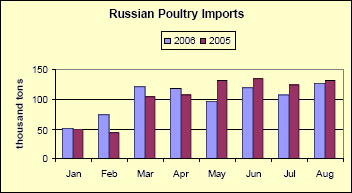



International Egg and Poultry Review
By the USDA's Agricultural Marketing Service - This is a weekly report looking at international developments concerning the poultry industry, this week looking at the latest in Russia and the EU.
RUSSIA
Meat and poultry production increased 3.9 percent to 3.7 million metric tons from January through July 2006, when compared to the same
period a year earlier. Egg production increased 2.8 percent to 22.6 billion eggs. Broiler production in 2006 is expected to increase 20 percent and will continue to grow an additional 18 percent in 2007. Turkey production is also growing as new turkey facilities are being built and because turkey meat prices are much higher than broiler prices in Russia.
 Poultry meat consumption has recovered from the drop following highly publicized outbreaks of avian influenza in late 2005 and early 2006.
Consumption of poultry meat in Russia increased 4 percent in June 2006 compared to the previous month. According to the Russian Federal Customs Service (FTS), January through August poultry imports fell to 818,4000 metric tons, compared to 834,000 metric tons during the first eight months in 2005. U.S. poultry exports under the H.S. code 0207 for January through August 2006 totaled 513,862 compare to 502,798 metric tons for the same period a year earlier.
Poultry meat consumption has recovered from the drop following highly publicized outbreaks of avian influenza in late 2005 and early 2006.
Consumption of poultry meat in Russia increased 4 percent in June 2006 compared to the previous month. According to the Russian Federal Customs Service (FTS), January through August poultry imports fell to 818,4000 metric tons, compared to 834,000 metric tons during the first eight months in 2005. U.S. poultry exports under the H.S. code 0207 for January through August 2006 totaled 513,862 compare to 502,798 metric tons for the same period a year earlier.
Poultry stocks this spring were large due to a sharp reduction in
consumption caused by avian influenza outbreaks. As a result,
the Ministry of Agriculture began supporting poultry shipment
restrictions – cancellation of poultry veterinary import permits
and pressuring poultry importers to “voluntarily” cut their imports
by 30 percent.
 The Russian government is currently reviewing a draft of a new
technical regulation, which would significantly elevate import
requirements of poultry meat and processed poultry products.
The Russian government is currently reviewing a draft of a new
technical regulation, which would significantly elevate import
requirements of poultry meat and processed poultry products.
The Russian Poultry Union (RPU) insists that Russia should ban production of all food products (cutlets, sausage, MDM) made from
(imported) frozen poultry. The draft technical regulation allows only chilled meat to be used for processing. If approved, the change would
affect poultry storage conditions at factories, feeding facilities, meat storage and processing. Market players believe this would have a strong impact on poultry meat imports leading to an immediate 10 percent increase in poultry prices. According to meat processing experts, frozen
meat accounts for about 95 percent of all raw material used by meat processors. Domestic chilled poultry is much more expensive than
imported frozen poultry so the new requirement if approved would significantly increase production costs.
Source: USDA/Foreign Agricultural Service, Russian Federal Customs Servicee
EUROPEAN UNION
The European Commission adopted a new strategy to integrate trade policy into the European Union’s competitiveness and economic
reform agenda. The policy review (Global Europe: competing in the world) sets out a strategy for opening new markets abroad for EU
companies to trade and ensuring that European companies are able to compete fairly in those markets.
It also commits Europe to ensuring
that its own markets remain open, arguing that in a global market, with global supply chains, Europe needs to import to export.
The EU’s new policy says that bilateral accords can address “key issues including investment, public procurement, competition, other
regulatory issues and IPR enforcement, wich remains outside the WTO at this time.”
On this basis, it identifies ASEAN (10 Southeast Asian nations), Korea, and Mercosur (Argentina, Brazil, Paraguay, Uruguay, Venezuela) as
priority targets, along with India, Russia, and the Gulf Cooperation Council. The EU has already started FTA talks with the Gulf Cooperation
Council, which comprises six Arabian Peninsula countries centred around Saudi Arabia. Its FTA negotiations with Mercosur, suspended
since 2005 over disagreements on agriculture, industrial goods, investment, and services, are set to resume in November. Brussels and
New Delhi are also exploring possibilities for starting FTA talks. The paper did not call for an FTA with China in spite of its large and growing market, saying that the country required “special attention because of the opportunities and risks it presents.”
Source: European Commission Trade Issues, BRIDGES Weekly Trade News Digest www.ictsd.org
To view the full report, including tables please click here
ThePoultrySite News Desk











